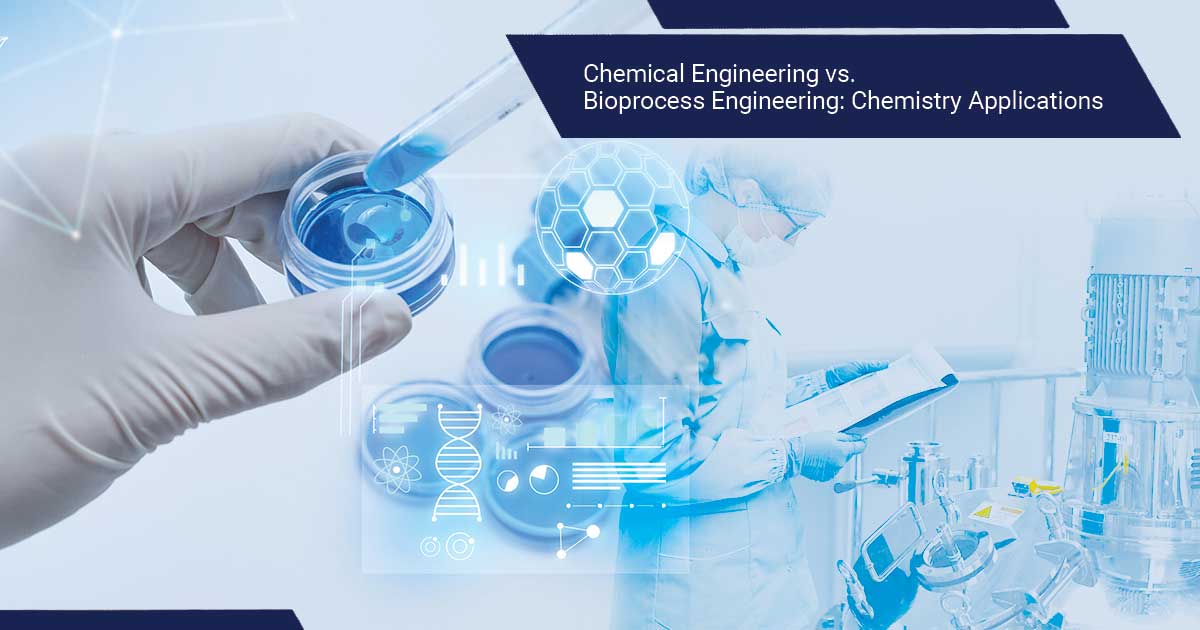FET Blogs


FET Blogs



18 March 2024
Engineering offers a vast array of specialised branches. Amidst the multitude of options available, it is often a challenging task to choose one specialisation that truly piques interest. However, the decision becomes even more complex when you encounter two closely related engineering disciplines like chemical engineering and bioprocess engineering.
Today, we will explore two such closely intertwined branches: "Chemical Engineering" and "Bioprocess Engineering." Chemical engineering focuses on the design and operation of industrial manufacturing plants, with a primary emphasis on the production of chemicals and various products that undergo chemical processing. Conversely, bioprocess engineering applies chemical engineering principles to focus on industrial processes and biological components, such as living cells and their constituents. Let us study these two engineering domains, the courses available, the curriculum, and their promising career prospects!
The undergraduate courses available in the fields of chemical and bioprocess engineering comprises a Bachelor of Engineering (B.E) and a Bachelor of Technology (B.Tech). For students interested in higher education, there are post-graduate programmes such as Master of Engineering (M.E) and Master of Technology (M.Tech). Moreover, students have the option to pursue diploma or certification courses to augment their expertise and proficiency in their respective sub-disciplines.
While the duration of UG programmes entails four years, PG programmes are generally two-year courses in India. The duration of the diploma and certification courses can vary, ranging from six months to one year.
The eligibility criteria for UG admissions encompass a successful completion of 10+2 with a minimum score of 50 percent from an accredited institution. The applicants should have pursued mathematics, physics, and chemistry as major subjects during their high school education. Besides this criterion, the selection process for most colleges and universities generally involves entrance examinations and personal interviews. Students interested in pursuing a lateral entry into B.Tech programmes are required to hold a diploma programme from a recognised institution. On the other hand, students applying for PG courses should hold 50% marks in their B.E/B.Tech degree, followed by a valid GATE score. Similarly, candidates who have completed a 5-year programme in science or applied sciences can also apply for M.Tech courses.
Chemical engineering courses focus on the study of processes and designs related to chemical plants and production methods. In this engineering field, students gain a robust understanding of various subjects, including chemistry, materials, mechanics, fundamental principles of chemical engineering, petrochemicals, and operational procedures. Students learn about the principles of physics and chemistry, mathematics, biology, economics, and more. Other crucial subjects covered in the curriculum are material science, renewable energy sources, fluid mechanics, and more.
Conversely, bioprocess engineering provides a strong foundation in key aspects of bioprocess research, emphasising its significance and practical applications in relevant industries. The curriculum equips students with the knowledge and skills required to produce biofuels, develop enzymes for nutritious food, and comprehend the conversion of waste materials into energy sources. The core topics addressed in this curriculum include pharmaceuticals, petrochemicals, waste management, pollution control, and metallurgical processing.
In contemporary India, chemical engineering stands out as one of the most in-demand career choices. Students can harness their knowledge to pioneer innovative technologies, opening up lucrative prospects in fields such as environmental conservation and ensuring health and safety. Students can work as process engineers, optimising manufacturing processes and designing systems for chemical production. Furthermore, students can venture into research and development, contributing to innovations in pharmaceuticals, materials, and sustainable energy. Environmental engineering offers a pathway to work on critical global challenges like pollution control and sustainable resource management. Students interested in entrepreneurial ventures can explore careers in project management and consulting related to strategic planning, cost analysis, and client collaboration.
After the completion of their degree in bioprocess engineering, students will have plenty of career opportunities in the fields of vaccines, antibiotics, food and agricultural products, pharmaceutical supplements, and others. Students can contribute to research and development in biotechnology companies, advancing breakthroughs in healthcare, agriculture, and renewable energy. Environmental bioprocess engineers are responsible for developing sustainable strategies for waste management and the mitigation of pollution. Furthermore, there are career prospects available in areas like pharmaceutical and biotechnology sectors. Bioprocess engineering students can also explore roles in food and beverage production, responsible for ensuring food safety, quality, and innovation. With the growing importance of sustainable practices, bioprocess engineers play a pivotal role in the fields of bioremediation and bioenergy.
We can understand that prospects are promising in both fields. Both disciplines offer various career paths, from research and development to regulatory affairs. Chemical engineers play a crucial role in designing environmentally friendly technologies. On the other hand, bioprocess engineers work on vaccines, antibiotics, food, pharmaceuticals, and renewable energy. While chemical engineering deals with industrial plant design and chemical production, bioprocess engineering applies chemical principles to biological processes. Both fields offer undergraduate and postgraduate programmes, along with diploma courses. Students can align their interests and career goals before taking the final call!
A1: Chemistry in chemical engineering is used for designing processes like fuel production.
A2: Bioprocess engineering is used in pharmaceuticals, biofuels, and food production.
A3: Bioprocess engineering’s future lies in sustainable biotech and personalised medicine.
A4: Bioprocesses are eco-friendly, use renewable resources, and support biological production.
Popular Post
17 February 2026
AIE Full Form
10 February 2026
AEIE Full Form
22 January 2026
AE Full Form
16 January 2026
What is Aerospace Engineering?
16 January 2026
What is Chemical Engineering?
Ask an Expert for Free